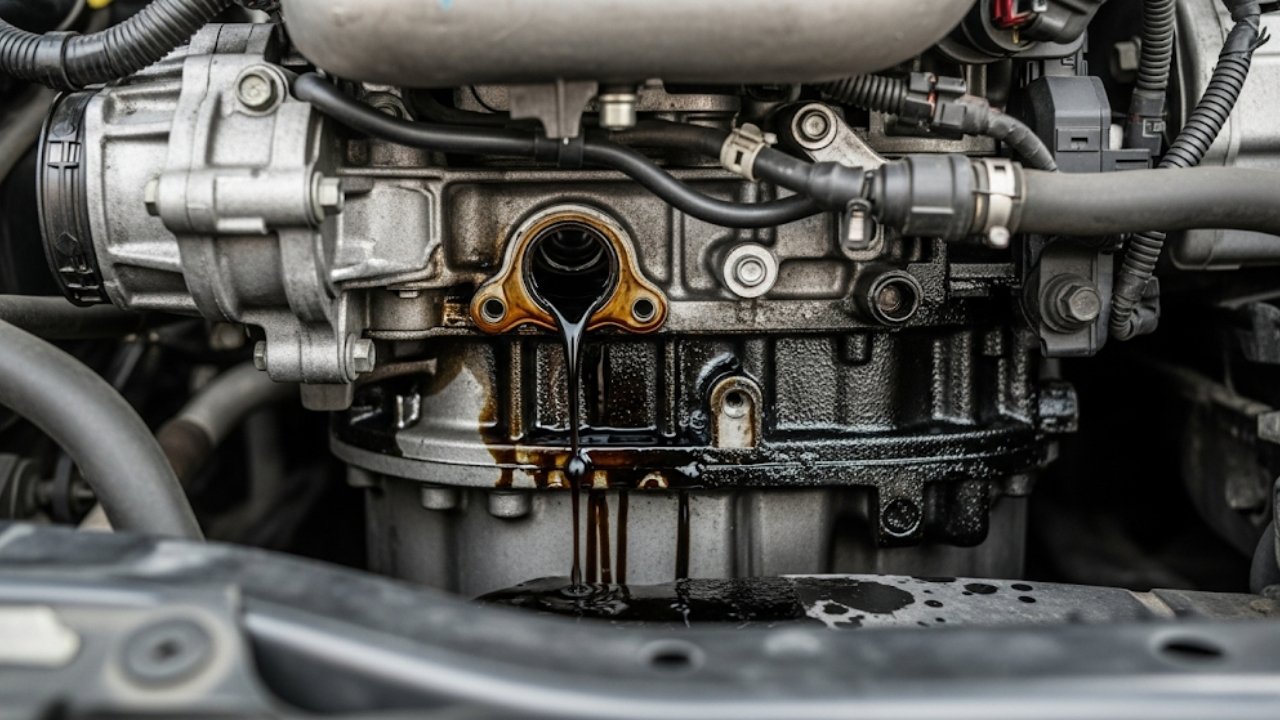Why Your Car Smells Like Oil When Heater Is On

Have you ever turned on your car heater on a chilly morning and caught a strong oil smell blowing through the vents? It’s a weird feeling—comfort from the warmth, but discomfort from the odor. If your car smells like oil when heater is on, it’s not just an annoyance. It could be your car’s way of asking for help.
I’ve personally dealt with this issue during a Dhaka winter. The moment the heater turned on, the cabin would fill with an oily scent that lingered. At first, I thought it was nothing—maybe something from the garage or the road. But over time, it became clear: something was wrong under the hood.
In this article, we’ll explore why your car smells like oil when heater is on, how to identify the root cause, and what you should do about it. Think of this as advice from a friend who’s been there and wants to save you from headaches, mechanics, and more oil-stained shirts.
What Causes the Smell of Oil in Your Car Heater?

-
Oil Leaks Near the Engine or Exhaust
-
Valve Cover Gasket Failure
-
Oil Spilled During Last Change
-
Cracked or Damaged Hoses
-
Heater Core Contamination
-
Worn Engine Components
Each of these culprits can send the smell of oil right into your cabin the moment the heater turns on. Why? Because your heater draws air from around the engine, where temperatures rise and odors intensify.
Real Story Example:
Last year, my cousin’s car started smelling like oil every time she turned the heater on during a foggy January. She ignored it for weeks, assuming it was “just car stuff.” When she finally checked, oil had been leaking from the valve cover and burning slowly on the exhaust manifold. Not only was it stinky—it was dangerous.
How the Car Heater System Works with Engine Odors
To understand why your car smells like oil when heater is on, you need to know how your heater works. It doesn’t create heat like a home heater. Instead, it uses heat from your engine’s coolant system.
Here’s a simple breakdown:
-
Your engine heats up while running.
-
Coolant absorbs the heat.
-
The hot coolant flows through a small radiator (heater core).
-
The blower fan pushes air through this core and into your cabin.
If oil leaks near the engine or exhaust, heat vaporizes it. That vapor can get drawn into the intake system, especially when set to pull outside air. When the blower kicks in—bam!—your car smells like a mechanic’s shop.
Table: Comparison Between Heater & AC Odor Issues
| System | Typical Odor Cause | Symptoms |
|---|---|---|
| Heater | Oil leaks, valve gasket damage | Burning oil smell when heater on |
| A/C | Mold, dirty cabin air filter | Musty or sour smell during cooling |
So if the smell only shows up with the heater on, the issue is likely heat-related and connected to oil exposure.
Common Reasons Your Car Smells Like Oil When Heater Is On
Let’s break down some of the most common causes that make your car smell like oil when heater is on, and how you can tell which one is haunting your ride.
1. Valve Cover Gasket Leak
This is by far one of the most common causes. The valve cover gasket is a rubber seal that keeps engine oil from spilling out of the top of your engine. Over time, especially in hot climates or older cars, the gasket wears out or cracks.
When that happens, oil drips onto hot engine parts—like the exhaust manifold. The moment you start the car, it burns slowly, releasing that signature smell. Once you turn on the heater, the air circulating over the engine picks up that burnt oil vapor and brings it right to your nose.
Signs to Watch:
-
Oil stains on your driveway or under the hood
-
Smoke from the engine bay
-
Oil level dropping between changes
Personal Tip: I once fixed this issue myself with a $25 gasket kit and an afternoon of elbow grease. But if you’re not comfortable opening up the engine, definitely take it to a mechanic.
2. Oil Spilled During Oil Change
Sometimes the culprit isn’t mechanical failure. It’s just…mess. If you recently had your oil changed (especially at a quick-service garage), a small spill near the engine can produce that oily smell once it heats up.
Even a few drops of oil can bake on hot parts like the exhaust shield or heat shields. This gets worse if the oil wasn’t wiped off properly. It usually clears up after a few drives, but if it lingers more than a week, you might want to investigate further.
Tip for Next Time:
Ask the mechanic to clean up any oil that spills near the engine. A quick wipe with degreaser can prevent weeks of smelly drives.
3. Cracked Oil Cap or Loose Oil Filter
If your oil cap is loose or cracked, engine oil can splash out while the car is running. Similarly, a poorly installed or old oil filter might leak under pressure.
This leads to oil dripping on hot surfaces—again causing that infamous smell when the heater system circulates warm air from under the hood.
How to Check:
-
Inspect your oil cap for cracks
-
Make sure it’s tightly sealed
-
Check for oil around the filter or engine block
Don’t ignore small things like this. I once drove my dad’s old Toyota for weeks with a loose cap until I found a pool of oil collecting near the fan belt. Close call!
4. Engine Oil Leaking onto the Exhaust
This is one of the most serious reasons your car smells like oil when heater is on. The exhaust system gets extremely hot. If engine oil finds its way there—even a small amount—it vaporizes immediately, creating a thick, pungent smoke.
The fumes aren’t just irritating. They can be toxic, especially in a closed car cabin. It’s something you need to fix right away.
Warning Signs:
-
White or blue smoke under the hood
-
Oil visibly dripping near exhaust pipes
-
Increased oil consumption
If this is the issue, stop driving and get it towed. You don’t want those fumes affecting your health or risking a fire.
5. Damaged PCV Valve or System
One sneaky cause that many people overlook is the Positive Crankcase Ventilation (PCV) valve. This part controls engine gases and sends them back through the intake to reduce emissions. But if the PCV system is clogged or broken, it can cause oil vapors to escape into the engine bay or heater intake.
Those oily vapors then mix with the air drawn into the heater, creating a strong oil smell inside the car. It’s like a small oil mist floating into your dashboard vents—nasty and unhealthy.
Symptoms of a Failing PCV System:
-
Rough idle or engine misfires
-
Visible oil leaks around valve cover
-
Strong oil odor when heat or A/C is on
A faulty PCV valve is cheap to replace (usually under $20) but can lead to bigger engine problems if ignored. Check your car’s service schedule—it might be time for a PCV replacement anyway.
6. Heater Core Leaks (Rare but Nasty)
In some rare cases, if your car smells like oil when heater is on, it could be heater core contamination. The heater core uses hot coolant to warm your car’s air, but if that coolant is somehow mixed with oil, you’ll notice a strong, oily, almost sweet smell.
This is often a sign of a blown head gasket or engine mixing coolant and oil. It’s not a smell to ignore.
Red Flags:
-
Oily film on your windshield when heater is running
-
Coolant looks brown or milky
-
Engine overheating or loss of coolant
This is an expensive fix, so don’t jump to conclusions. Rule out the more common causes first. But if the heater core is leaking or the coolant is compromised, you’ll need a mechanic’s help fast.
Why You Shouldn’t Ignore the Oil Smell from Your Heater
You might be tempted to ignore the car smells like oil when heater is on problem, especially if your car drives fine. But here’s why you shouldn’t:
Potential Risks:
-
Fire hazard from oil dripping on hot parts
-
Health risks from inhaling fumes (especially kids or asthma sufferers)
-
Worsening engine damage due to oil leaks
-
Reduced fuel economy and performance
I once ignored a faint oil smell in my old Suzuki Swift thinking it was “just old car stuff.” Three weeks later, the engine was choking on a clogged PCV line, and I was out $300.
Take action early. A $25 gasket fix today can save you thousands tomorrow.
How Mechanics Diagnose the Smell
If DIY checks don’t help and the oil smell won’t go away, it’s time for professional help. Here’s what a mechanic usually does:
Typical Diagnostic Process:
-
Visual inspection of engine bay and heater vents
-
Use of UV dye and blacklight to track oil leaks
-
Sniff test under the hood and cabin
-
Check for smoke or vapor when car is warm
-
Inspection of gaskets, filters, PCV valve, and exhaust
Expected Cost Range:
| Repair Type | Estimated Cost (USD) |
|---|---|
| Valve Cover Gasket Replacement | $100 – $400 |
| Oil Cap or Filter Fix | $10 – $30 |
| PCV Valve Replacement | $20 – $100 |
| Heater Core Flush/Repair | $200 – $1,000+ |
| Leak Diagnosis & Cleanup | $50 – $150 |
Preventing Oil Smells in Your Car Heater: Smart Habits
The best way to keep your car from smelling like oil when heater is on is to be proactive. A little prevention goes a long way in keeping your cabin (and wallet) clean.
Easy Prevention Tips:
-
Change oil regularly and check for leaks
-
Inspect engine bay monthly for signs of oil spray or residue
-
After oil changes, check that filter and cap are secure
-
Don’t overfill oil (extra oil can leak and burn)
-
Replace the cabin air filter yearly
-
Fix small leaks early before they spread
Regular car maintenance isn’t glamorous, but it’s way cheaper than replacing a burnt-out exhaust manifold or dealing with smoke in your vents.
Quick Summary Table: Causes & Fixes
| Cause | Smell Timing | Fix |
|---|---|---|
| Valve cover gasket leak | Strong when heater on | Replace gasket |
| Oil spill from oil change | Faint smell | Clean engine surface |
| Loose oil cap/filter | Occasional smell | Tighten or replace |
| Oil on exhaust | Pungent, smoky | Immediate repair |
| PCV valve failure | Constant, strong | Replace PCV system |
| Contaminated heater core | Sweet, oily smell | Heater flush or repair |
FAQs: Car Smells Like Oil When Heater Is On
1. Is it safe to drive if my car smells like oil when the heater is on?
It depends. If the smell is light and just from a recent oil change, it may be okay for short drives. But if it’s strong or smoky, get it checked—it could be a fire hazard or health risk.
2. Can I fix this issue myself at home?
Yes, for minor causes like oil cap replacement, cleaning spills, or even replacing the PCV valve. But major leaks or heater core issues should be handled by a professional.
3. Why does the smell only happen when I turn on the heater?
Because the heater draws warm air from near the engine. If oil has leaked or is burning nearby, that smell gets sucked into the cabin vents.
4. Could a dirty cabin air filter cause an oil smell?
Not likely. A dirty filter usually causes musty or dusty smells. However, it can trap oily vapors and make things worse. Replacing it is cheap and worth a try.
5. How do I know it’s an oil smell and not something else?
Oil smells are distinct—thick, burnt, mechanical. If it’s sweet or chemical-like, it could be coolant. Musty? Probably mold. Learn your car’s scents—it’s like learning your kitchen!
6. How long does it take for oil smells to go away after a spill?
If the oil spill is minor and cleaned up, the smell usually fades in a few days. But if it burns on hot engine parts, the smell may linger until all residue is gone.
7. What happens if I ignore the smell?
You risk larger oil leaks, engine damage, and toxic air in your car. Plus, your passengers will definitely complain!
Final Thoughts: Don’t Ignore That Burnt Oil Scent
If your car smells like oil when heater is on, don’t shrug it off. Your car is talking to you—through smells, sounds, and signs. Listen to it.
Start with a simple inspection. If you spot leaks or weird fumes, don’t wait. Fixing a small issue today saves you big time tomorrow. And more importantly, it keeps your drives peaceful, clean, and safe.
Remember, your car’s heater is supposed to bring warmth—not warnings. Keep it that way by staying alert and taking action early. Drive safe and stay warm, friend.






